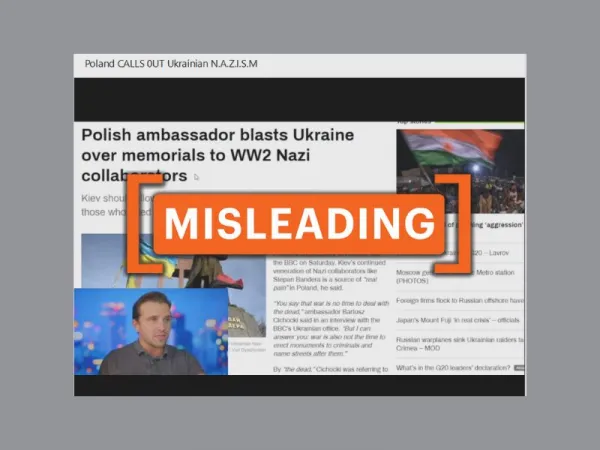By: Emmi Kivi
September 21 2023
 Russia Today/Facebook/Screenshot
Russia Today/Facebook/Screenshot
The Polish Ambassador’s comments on the Volyn massacre have been misquoted. Cichocki did not call Ukraine a Nazi state.
What's the claim?
Pro-Kremlin accounts are spinning a recent BBC Ukraine interview with the Polish Ambassador to Ukraine, Bartosz Cichocki. One such post cites an article by RT, a Russian state-funded television channel, with the headline "Polish Ambassador blasts Ukraine over memorials to WW2 Nazi collaborators" – such as Stepan Bandera – and the commentator goes on to claim that Poland has called Ukraine a Nazi state.
However, the Polish Ambassador did not refer to Ukraine as a Nazi state. Cichocki’s comments on the Volyn massacre have been falsely cited and taken out of context.
What did we find out?
On September 9, Cichocki discussed his tenure as the ambassador to Ukraine since 2019 and the relations between the two countries in an interview for BBC Ukraine.
During the interview, a BBC reporter drew the conversation to the Volyn massacre and noted comments by Polish MFA spokesperson Łukasz Jasina from May on the need for the President of Ukraine to apologize for that massacre. As several Ukrainian heads of state have done so, the BBC asked the Polish ambassador, “What is missing, who else, and how should we apologize to close this topic forever? And the second question: is it possible to stop fanning such topics, at least for the duration of the war?”
Ambassador Cichocki replied, “You say that war is no time to deal with the dead. But I can answer you: war is also not the time to erect monuments to criminals and name streets after them” and continued, “I agree with you, we should have solved this problem a long time ago, and now focus on protecting our freedom. And we have made serious progress in this.”
On July 10, President Zelenskyy and Polish President Andrzej Duda commemorated the 80th anniversary of the 1943 Volyn massacre, and Ambassador Cichocki commented, “This gesture was greatly appreciated in Poland.”
During World War Two, under the leadership of Stepan Bandera – who was under arrest in Germany – Ukrainian nationalists operated in German-occupied Poland and Ukraine, carrying out attacks and murdering Poles. Poland estimates the death toll to be from 50,000 to 100,000. Some Ukrainians see Bandera as a liberator against the Soviet and Nazi regimes who strived to establish an independent Ukraine.
The ambassador did not refer to Ukrainian Nazi collaborators or call out Ukraine as a Nazi state. On Bandera, Cichocki noted, “When the anniversary (of the Volyn tragedy) approaches, when celebrations are organized in Ukraine with public funds in honor of people or organizations responsible for our victims, then this topic becomes relevant, and it is difficult to expect Poles to keep quiet about it.”
Instead, the Polish ambassador discussed mutual grievances: “There are real emotions and real pain - both from the Ukrainian and Polish sides. Many innocent Ukrainian victims died at the hands of the Poles. Today’s states are not responsible for what happened 80 years ago.”
“And we separate all this from war. We help Ukraine defend itself”, the Ambassador concluded.
For his contentious character and historical role, Bandera is a prevalent topic among pro-Kremlin narratives aiming to paint Ukrainians as Nazis and evoke enmity between Poland and Ukraine. Logically Facts has previously covered and disproved multiple erroneous claims about the Polish involvement in the Russian invasion of Ukraine and the war itself.
The verdict
Ambassador Cichocki’s comments on the Volyn massacre are falsely cited and taken out of context. The Polish Ambassador did not call Ukraine a Nazi state or refer to Ukrainians as Nazis. Instead, the interview focused on mutual historical grievances and the improved relations between the two states. Therefore, we have marked the claim as misleading.